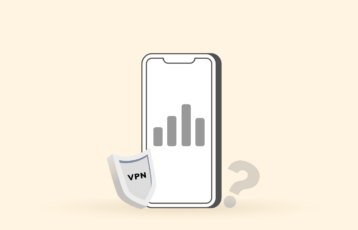Socks5 proxy is a fast and reliable protocol that primarily hides the real IP address. It routes the data packets through intermediary servers that generate an arbitrary IP and mask the location before the data reaches the destination. It helps the user access the geo-blocked sites and content. However, Socks5 does not encrypt online traffic, leaving it vulnerable to cyber-attacks.
Hence, for an extra protective layer, you still need a VPN. Luckily, the top-notch VPNs, including ExpressVPN, offer encryption protocols and Socks5 proxy technologies to work simultaneously, thus ensuring a robust protective shield for the users. But how do these two work? Let’s dig out more in this guide.
Socks5 and ExpressVPN: A match made in cyber heaven
The Socks5 proxy protocol is fast and reliable. It’s your tool to access blocked information or websites, or even if you just want to hide your IP address. Its great flexibility also enables it to work in tandem with any other protocol.
ExpressVPN is a service up there, playing with the big boys. It enables its users to make the most of the Sock5 proxy on its three thousand servers scattered in 160 locations in 94 countries around the globe. It’s a serious operation. Every server is optimized for speed and streaming. That allows its users to harness the aggregated power of ExpressVPN and Socks5, thus unblocking geo-restricted content and media streaming sites in 94 countries worldwide. No more limitations for your entertainment needs. You can watch whatever you want, whenever you want, wherever you want. It’s as simple (and powerful) as that.
But access is not the only advantage you will get. Being a VPN, privacy, and security are a priority for ExpressVPN, so the platform also ensures that your data is safe when you use the Socks5 proxy. If, for some reason, the VPN connection breaks, it triggers a kill switch that stops all internet-related activities. Thus, no data or IP address leak is possible (as it would remain with the Sock5 proxy acting independently). All your data in ExpressVPN is encrypted through its private DNS server, so even the route your connection follows is secured.
And there is also the TrustedServer technology. This is a relatively new feature in ExpressVPN. This new protocol stores all your browsing session’s data (site cookies, for instance) in the RAM instead of the hard drive. Thus, all the information is lost as soon as the system reboots. No logs are kept, and forensic analysis cannot recover data from previous activities.
Let’s not forget that while Socks5 is a powerful and efficient protocol that helps with privacy, it’s not a factotum. It hides your IP, and that is all. This is why it needs complementation. ExpressVPN offers the best encryption in the market combined with the most secure VPN protocols available OpenVPN with UDP, OpenVPN with TCP, L2TP/IPsec, PPTP). The Socks5 layer can work in tandem with each of those technologies, thus speeding up the encryption process and data transactions.
So, Socks5 is there, optimized, and configured to work along with the other protocols. That results in increased speed for ExpressVPN’s encryption process so that the delay we usually find in VPNs because of the added layer of encryption becomes nearly negligible.
That will enable you to stream videos and keep your torrents up for as long as you want, whenever you want, and still enjoy the highest possible quality because the transfer speeds are high. So, the cool thing about using ExpressVPN with the Socks5 protocol is that they empower each other. ExpressVPN compensates for Socks5’s incomplete security and anonymity features. At the same time, Socks5 keeps ExpressVPN’s transfer speeds up when encryption without Socks5 would slow them down noticeably.
Read also: VPN vs. Proxy.
So, how do you use both technologies together?

Let’s say you want to run your VPN and Socks5 proxy on the same device. Some people will tell you that you can’t. They are wrong.
The first thing to do is to choose an excellent Socks5 proxy service. Yes, the best ones need a subscription and payment. If you want all the best that privacy and transfer speeds offer you, you must invest something in it; just accept it. Then, you download and install it and switch it on.
Next, you download and install the ExpressVPN application to your device. Start, log in, choose your favorite server, and browse. That’s it. It takes nothing more.
Once you’ve done those two simple things, all your data goes through your proxy. Then, the proxied bits and bytes will run through the VPN’s encryption process to reach their destinations safely, quickly, and anonymously.
Another way to use both technologies in tandem that applies to browsers only is to install a Sock5 proxy in your Google Chrome or Mozilla Firefox browser. Then you enable your VPN, and there you go.
Free Socks5 proxies: Should you use them?
You can indeed use a free Socks5 if you so choose. But you really should not. Or, at least, we can’t advise you to do it. Here’s why. Unless you know your chosen free Socks5 proxy server inside and out, you can’t possibly know if it’s full-featured.
Free servers must be cheap to operate, so they almost always have missing features, and they can never be as fast as a paid proxy. The support team often just does not exist, and they could also be relatively old and a bit behind in technical terms. And they don’t have too many personnel working in them either.
The other reason is overhead. Overhead is like entropy for digital transmissions. You can’t avoid it, even if you have a minor Sock5 proxy, and it costs money. Granted, those costs are not like those in a VPN, but somebody has to pay them. And who pays for free service? Well, you do.
In the digital world, always remember that if you are not being charged for a product, you are the product. In the case of free proxy servers, you become the product by providing the service with the information of what you do online that they can sell to third parties that know how to mine it and make it worthwhile for them.
So, as you keep using the free proxy, you start to see more ads that are more relevant to your recent searches and activities, for instance. It would be best if you never trusted an accessible server. Let’s not forget that critical information about yourself, such as browser history, but more importantly, your usernames, passwords, and even credit card details, will pass through the proxy.

